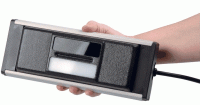5 Specialized Types of Lab Research Equipment
In your lab, you’re probably familiar with laboratory research products such as centrifuges, mixers, baths, microscopes, shakers, and stirrers. This standard equipment is used in many types of labs.

Cole-Parmer® 8-Watt UV Lamp with Dual 365nm Wavelength Light Tubes
The research lab may need specialized equipment to perform more complex procedures such as separating DNA, analyzing protein, and activating cultures. Here’s a list of five items that you may need for more specialized research:
- Electrophoresis apparatus including horizontal and vertical gel electrophoresis systems, reagents, imaging systems, and power supplies. Gel electrophoresis separates DNA, RNA or proteins via electric current, usually in an agarose gel.
- Extraction apparatus including distillation, arsine, cyanide, Kjeldahl determination, Kuderna-Danish concentration, and solvent recovery. Various extraction heaters address Kjeldahl determination on a macro or micro scale.
- Heating equipment covers multiple research needs. Block heaters work well for incubation and activation of cultures, enzyme reactions, blood urea nitrogen determinations, immunoassays, melting/boiling points. Drum heaters provide an efficient means of freeze protection, viscosity control, and materials maintenance at elevated temperatures. Environmental chambers create temperature humidity extremes. Furnaces are used for moisture drying, curing, aging and general testing. Heating mantles apply heat to containers and do not substantially increase the risk of the glassware shattering.
- Ultraviolet equipment of various types. Usually a germicidal light is used to examine bacteria, molds, yeast and viruses. Medium-wave lamps are mostly used in electrophoresis documentation and to identify minerals by their fluorescent response. Longwave, or black light, acts as leak detectors with fluorescent dyes.
- Ultrasonic cleaners process samples including hard metals, ceramics, glass, and plastic.


Comentarios
Publicar un comentario